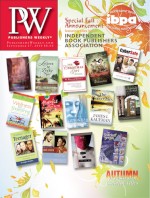Partnerships
In the recent lean years, publishers have looked for new sources of revenue. Corporate partnerships can help cover the production costs for a book and provide new channels for sales.
Key Porter Books has been keenly focused on hockey books for a number of years. And while publisher Jordan Fenn says the company has tightened its lists somewhat, publishing about 110 titles annually instead of around 170, it is still expanding the list of titles in its Fenn Publishing imprint. Devoted exclusively to hockey, Fenn publishes about 10 titles each fall, in addition to an official National Hockey League Stanley Cup Championship book each spring. Fenn has forged partnerships with the NHL, Hockey Canada, and the International Ice Hockey Federation. Key Porter works with the popular CBC hockey broadcast Hockey Night in Canada to produce an annual book and also has a new partnership with the NHL Player's Association. "With all of these licensing partners, we have to ensure that we produce product for them each year, so we're going to be seeing a much bigger hockey program coming from us every year," says Fenn.
Firefly Books also got in on the hockey action this year, signing a deal with the Hockey Hall of Fame in Toronto to produce six books over three years. The first two will be a 544-page guide to the players who are in the hall (with an initial print run of 40,000 copies) and an album-sized book on the goalies in the hall.
Strategic and Creative Marketing
As marketing budgets shrink, publishers are looking for new and cost-effective ways to reach consumers. Even large houses, such as Random House of Canada, are using their marketing dollars carefully and looking for ways they can make the most impact.
Event marketing has become more concentrated. "We're very strategic in terms of the events we do now. Gone are the days when you put an author into a bookstore and hope that two people show up," says Tracey Turriff, senior vice-president, director of marketing and corporate communications, at RH.
Brad Martin, RH Canada CEO, explains that the company markets in different ways to occasional readers, who are primarily looking for help choosing what to read, and avid readers. These avid readers are people who want to be drawn closer to the creative process, he says. They are the people who will come out to events and will talk about the books they are reading and influence others.
A similar aim can be seen in some of Hachette Book Group Canada's event marketing. The Globe and Mail's Globe Recognition lunches with Tony Hsieh (Delivering Happiness) and Sheena Iyengar (The Art of Choosing) for the newspaper's subscribers enabled HBGC authors to connect with a large audience of business and cultural leaders, says Sophie Cottrell, vice president and communications director.
Random House of Canada is doing fewer but larger events that can draw crowds. The most ambitious is the Globe and Mail Open House Festival, a spring readers' festival modeled after the New Yorker festival. This year's events, which included such international authors as Camille Paglia, Barbara Coloroso, Ishmael Beah, Pico Iyer, Colm Tóibín, Joanna Trollope, and Ian McEwan, were sold out.
Louise Dennys said that the Globe's sponsorship was vital to the success of the festival and helped make it a destination for people from outside Toronto, such as a couple she met at one of the events who had traveled from Winnipeg to hear one particular author.
However, she also observed that while some traditional avenues of marketing such as book pages in newspapers have diminished, "what we are discovering and gaining instead are these tremendously interesting ways of reaching out through electronic [means, such as] our BookLounge.ca, bookclubs.ca, social media, our carefully honed events. We're increasing the relationship between the publisher and the reader on behalf of the author."
Penguin Canada had some creative help from author and artist Douglas Coupland drawing readers closer to celebrate its 75th anniversary. In a project called Speaking to the Past, he created 30 postcards in the style of Penguin jackets that reflect present perspectives on the past. Yvonne Hunter, Penguin Canada's vice president of marketing and publicity, says her favorite reads, "The moon. We stopped going there 40 years ago." Posted online, the site invited its readers to create their own Penguin jacket. There were 8,000 hits in the first day, Hunter says.
Another creative effort came from HarperCollins Canada for Emma Donoghue's Room. Long before it was shortlisted for the Man Booker prize, the company made a book trailer for the novel. Using a script of quotes from the book read by a five-year-old boy and animation of childlike art, the in-house team created a trailer that was simple but aptly haunting for the story of a boy and his mother held prisoner in a room. Rob Firing, director of publicity and communications, says Indigo distributed the trailer exclusively on in-store kiosks and hosted it online for a couple of weeks in September, and it was e-blasted to all of Indigo's iRewards members. "It's a kind of in-store placement. It's very important for a book to have that kind of focus, right at the retail location. It's on the front page of the kiosk," he says. The video was so effective it went viral, quickly crossed the border, and was picked up by New York magazine.



 Volume 257
Issue 38
09/27/2010
Volume 257
Issue 38
09/27/2010





